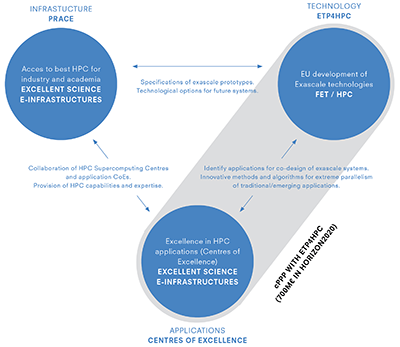Over the last decades, the availability and usability of high performance computing (HPC) systems has become one of the determining factors for the progress of science and a strategic resource for Europe's future. The accuracy of the analysis, the quality of the results and the potential of national and international collaborations depend more and more on the available computing infrastructure - not only in climate science, but in science and industry in general. Mastering advanced computing technologies from hardware to software has become essential for innovation, growth and jobs.
For the European Commission, HPC needs an EU-level policy to optimise national and European investments, addressing the entire HPC ecosystem. Therefore, its HPC Strategy was adopted in 2012 and implemented in the biggest EU Research and Innovation programme: Horizon 2020.
Based on contractual Public-Private Partnership on HPC (cPPP on HPC), a strong cooperation with the HPC stakeholders has been set up and an ambitious Research & Inovation funding strategy, addressing the following aspects (see Figure 1) has been developed:
- HPC facilities via the Partnership for Advanced Computing in Europe (PRACE), established since October 2012
- HPC technologies via the Future and Emerging Technologies (FET) programme, represented by the the European Technology Platform for HPC (ETP4HPC)
- and HPC applications via the establishment of Centres of Excellence (CoEs); the CoEs are funded via the e-infrastructures programme which aims to address the needs of European researchers for digital services in terms of networking, computing and data management.
These three pillars build the European HPC Ecosystem.
Figure: The three pillars of the European HPC ecosystem [ETP4HPC SRA 2015 Update, page 9].
The balanced evolution of these three elements ensures the development of a globally competitive HPC ecosystem that benefits the European economy and citizens. The European Extreme Data and Computing Initiative (EXDCI) coordinates the implementation of the European HPC strategy.
On the way to a world leading European HPC economy
 In November 2018, the The European High-Perfomance Computing Joint Undertaking (EuroHPC JU) started. It is a legal and funding entity that will enable pooling of EU and national resources in High Performance Computing (HPC) with the aim of developing a pan-European supercomputing infrastructure and supporting research and innovation activities in this field. This action will avoid long term negative effects, both on the digital economy but also for Europe's data sovereignty and scientific and industrial leadership. For more information, see the EuroHPC JU official website.
In November 2018, the The European High-Perfomance Computing Joint Undertaking (EuroHPC JU) started. It is a legal and funding entity that will enable pooling of EU and national resources in High Performance Computing (HPC) with the aim of developing a pan-European supercomputing infrastructure and supporting research and innovation activities in this field. This action will avoid long term negative effects, both on the digital economy but also for Europe's data sovereignty and scientific and industrial leadership. For more information, see the EuroHPC JU official website.
 The European co-design for exascale applications (EuroEXa) project targets to provide the template for an upcoming exascale system by co-designing and implementing a petascale-level prototype with ground-breaking characteristics. To accomplish this, the project takes a holistic approach innovating both across the technology and the application/system software pillars.
The European co-design for exascale applications (EuroEXa) project targets to provide the template for an upcoming exascale system by co-designing and implementing a petascale-level prototype with ground-breaking characteristics. To accomplish this, the project takes a holistic approach innovating both across the technology and the application/system software pillars.
 To assist the EuroHPC JU within the field of resarch and innovation activities, the FocusCoE project started in December 2018. It supports the Euopean HPC CoEs by creating a broader platform to coordinate strategic directions and collaborations and is providing support services for the CoEs by acting as a focal point for users to discover those services. With these activities the project aims to ensure that extreme scale applications result in tangible benefits for addressing scientific, industrial or societal challenges. For more information, see the FocusCoE official website.
To assist the EuroHPC JU within the field of resarch and innovation activities, the FocusCoE project started in December 2018. It supports the Euopean HPC CoEs by creating a broader platform to coordinate strategic directions and collaborations and is providing support services for the CoEs by acting as a focal point for users to discover those services. With these activities the project aims to ensure that extreme scale applications result in tangible benefits for addressing scientific, industrial or societal challenges. For more information, see the FocusCoE official website.
An extensive list of projects and initiatives is available on Projects about HPC.

